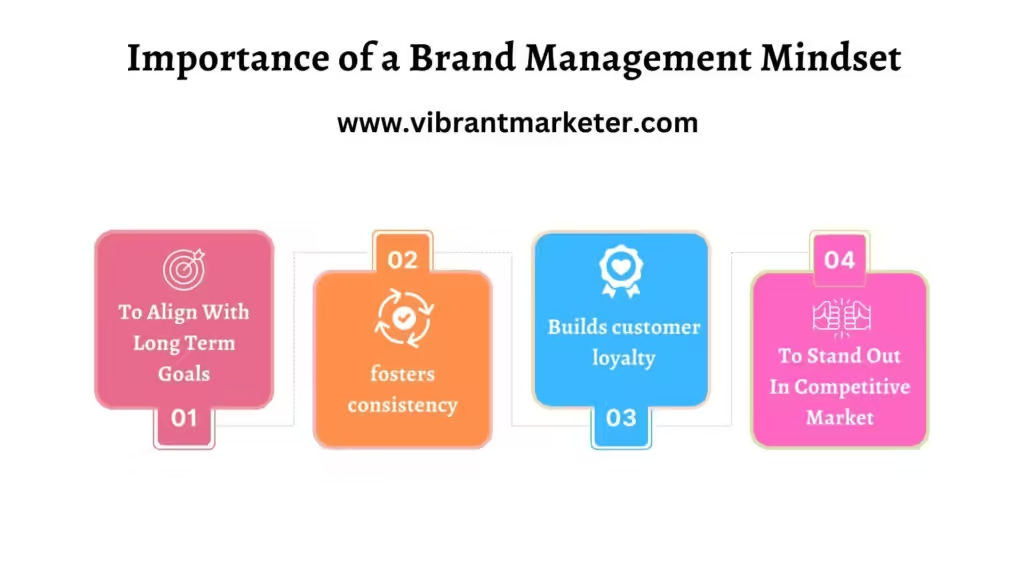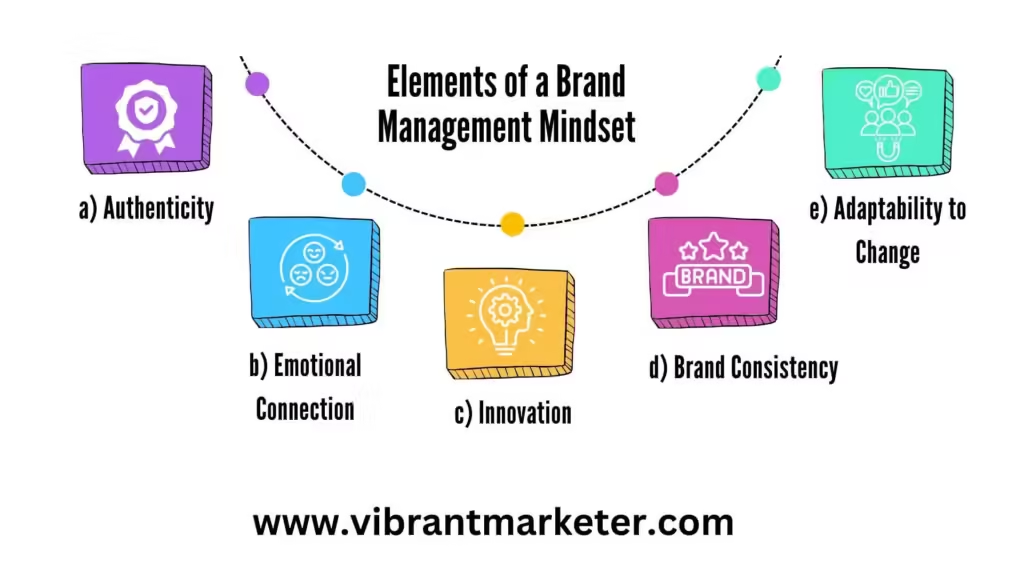
What is the Mindset of a Brand Manager? ( 10 FAQ Answered)
What is the Mindset of a Brand Manager, its Importance and Right Approach to become a Brand Manager

A brand manager’s mindset is the way they think, make decisions, and approach their work to grow and maintain a brand. It’s about creating a lasting impression in customers’ minds and ensuring that every interaction with the brand reflects its values, promises, and personality. A brand manager’s mindset is customer-centric, focused on long-term vision, adaptability, and consistency.
Definition: The Mindset of a Brand Manager
A brand manager’s mindset is the mental framework used to make decisions and guide the brand’s journey. It involves a balance between creativity and analytical thinking, ensuring the brand stays true to its core values while adapting to market trends. This mindset requires a deep understanding of customer needs and desires, along with the ability to foresee industry changes and adjust strategies accordingly.
Example: 1
Imagine Apple’s brand manager. Their mindset isn’t just about selling iPhones. It’s about maintaining Apple’s image as an innovator, ensuring customer loyalty, and preserving product quality and design consistency. This mindset influences every decision, from marketing campaigns to customer service policies.
Example: 2
Consider Tesla’s brand manager. They aren’t just concerned with selling cars. Their mindset is centered around innovation, sustainability, and premium quality, which guides every decision—from product development to marketing campaigns
The Importance of a Brand Management Mindset

- Aligns with Long-term Goals A solid mindset ensures that every action taken is part of a bigger, long-term plan. For instance, Tata Group in India has focused on trust and quality for over 150 years. Their long-term vision helped them grow from a small trading company to a global business. Tata’s consistency in following its core values of sustainability and social responsibility has kept them in the market for over a century.
Tip: Always think about the future while making brand decisions today. Focus on goals that will matter in 5-10 years, not just tomorrow.
2. Fosters Consistency A strong mindset ensures that the brand’s message, values, and tone remain the same across all platforms. For example, look at Amul in India. Amul’s “Utterly Butterly Delicious” campaign has been running for decades, and their humorous ads have stayed consistent with their brand voice. This consistency helps people immediately recognize and trust the brand. According to a study by Lucidpress, brands that maintain consistency see a 33% increase in revenue.
Tip: Always keep the brand’s tone and message aligned, no matter how many channels you are using.
3. Builds Customer Loyalty A brand management mindset helps create a connection with customers. When people feel they know and trust a brand, they stick with it. For example, Apple has built an emotional connection with customers through its sleek, user-friendly products and consistent focus on innovation. This is why Apple’s customer loyalty rate is around 90% (as per a Statista report in 2023). People feel like they are part of something bigger when they buy Apple products.
Tip: Always listen to customer feedback and align your product or service with their needs to create strong loyalty.
4. Helps Stand Out in a Competitive Market When a brand manager has the right mindset, the brand stands out even in crowded industries. Zomato, for example, differentiates itself through witty marketing and personalized customer service. Their quirky tweets and personalized in-app notifications make them memorable, which is why their user base grew to 17 million in 2023.
Tip: Use creative strategies like personalized marketing or unique brand voices to stand out from competitors.
Why it Matters:
- Consistency: When a brand’s message is consistent across all channels, it creates a unified identity, which strengthens customer trust.
- Loyalty: A brand manager with the right mindset builds relationships that lead to customer loyalty, which is vital for long-term success.
- Differentiation: The right mindset allows brand managers to discover what sets their brand apart from the competition and helps to position the brand effectively.
Case Study: Nike’s Consistent Brand Positioning
Nike’s brand managers have maintained their focus on empowerment and performance over the years. Whether it’s through their iconic slogan “Just Do It” or their partnerships with top athletes, Nike’s consistency in messaging has built an incredibly loyal customer base.
Data Point:
Research from Forbes indicates that 64% of consumers cite shared values as the primary reason for brand loyalty.
How to Develop a Brand Management Mindset
Developing the right mindset requires discipline, learning, and strategic thinking. Here’s how a person can develop it:
- Customer-Centric Thinking
A brand manager should always start with the customer. Understanding customer needs, preferences, and pain points can help guide brand decisions.
Example:
Amazon’s brand managers constantly think about the customer experience. Their mindset revolves around providing convenience and excellent service, which is why they introduced services like 1-day shipping and Alexa for customer convenience.
2. Long-Term Vision
A brand manager must think beyond short-term gains. They should focus on building a brand that will grow over time and maintain relevance.
Tip:
Nike’s brand managers didn’t just focus on selling shoes—they positioned Nike as a symbol of aspiration and performance, ensuring long-term brand loyalty.
3. Adaptability
The marketplace changes, and so must a brand manager’s mindset. Thay have to adopt and observe quickly the changes made in marketplaces.
Example:
Netflix’s shift from DVD rentals to streaming services is a classic example of how a brand management mindset needs to adapt to new technologies and changing customer behavior.
4. Analytical Approach
A good brand manager needs to rely on data-driven insights to make decisions. Understanding analytics, market trends, and customer feedback ensures better strategy formulation.
Key Elements of a Brand Management Mindset

Several key components define an effective brand management mindset:
a) Authenticity
Being true to the brand’s core values builds trust. A brand that feels fake or inauthentic will lose customer support.
Case Study: Patagonia’s Authenticity in Sustainability
Patagonia’s commitment to environmental responsibility is genuine. From their products to their corporate practices, everything aligns with their mission to protect the planet. This authenticity has built a loyal customer base that believes in their cause.
b) Emotional Connection
Successful brands connect emotionally with their audience, creating strong bonds that go beyond the product itself.
Example: Coca-Cola
Coca-Cola’s marketing focuses on creating emotional experiences like joy and togetherness, which helps people connect emotionally to the brand.
c) Innovation
Brands that lead the market are often the ones that innovate. Brand managers with this mindset are constantly seeking new ideas and ways to improve.
Data Point:
According to a report by McKinsey, companies that foster a culture of innovation experience 2x faster revenue growth than their competitors.
d) Brand Consistency
Consistency in how the brand presents itself, from logos to messaging, is key to maintaining trust.
e) Adaptability to Change
Being open to new trends and technologies helps brands stay ahead of the curve and ensures their long-term relevance.
The Right Mindset for Brand Management

The right mindset for a brand manager combines several key factors:
a) Growth-Oriented
A brand manager should always seek growth opportunities, be it through new markets, products, or customer segments. They must think big but also execute small, incremental changes that lead to greater long-term success.
b) Customer First
Everything a brand manager does should revolve around customer satisfaction and engagement. By deeply understanding the customer’s journey, pain points, and preferences, they can shape a brand that people love and trust.
c) Holistic Thinking
Brand managers must think beyond marketing and include every aspect of the brand, from product design to customer service.
d) Collaborative
A brand manager works with different teams—product, sales, finance—to ensure the brand’s success. The right mindset emphasizes collaboration and communication across departments.
e) Resilience
In times of crisis, a strong mindset helps navigate challenges. A resilient brand manager remains calm under pressure and focuses on finding solutions without compromising the brand’s integrity.
The Role of Brand Storytelling
Brand storytelling is a powerful tool in a brand manager’s toolkit. It involves creating narratives around the brand that resonate with customers on an emotional level.
Why Storytelling Matters:
- Emotional Engagement: Stories capture attention and build emotional connections. For example, Apple doesn’t just sell products—they tell stories of creativity and empowerment through their “Think Different” campaign.
- Brand Identity: Storytelling helps shape how customers perceive the brand. It allows a brand manager to create a narrative that aligns with the brand’s core values.
Case Study: Dove’s Real Beauty Campaign
Dove’s storytelling focused on real women, not models, which resonated emotionally with a broad audience. It positioned Dove as a brand that cares about redefining beauty standards, fostering an emotional connection with customers.
The Impact of Digital Transformation
In today’s digital age, brand managers must understand how to leverage digital marketing tools like social media, SEO, and data analytics.
How Digital Transformation Impacts Brand Management:
- Real-Time Engagement: Brands can now engage directly with customers through social media, building relationships instantly.
- Personalized Marketing: Digital tools allow brands to tailor their messaging to individual customers based on their online behavior.
Example: Nike’s Use of Digital Platforms
Nike has used digital platforms like its Nike Run Club app to foster a community of fitness enthusiasts. By leveraging digital tools, Nike offers personalized training plans and connects users directly to the brand.
Measuring Brand Success
To know if their efforts are working, brand managers need to measure their brand’s success using key metrics.
Key Metrics:
- Brand Awareness: How many people know about your brand?
- Customer Engagement: How often are customers interacting with your brand (likes, comments, shares)?
- Customer Loyalty: Repeat purchases and long-term customer relationships are critical indicators.
- Sales Growth: How does brand management contribute to an increase in revenue?
Data Point:
According to Statista, 89% of marketers say brand awareness is their top goal in digital marketing, showing how critical it is for brand success.
Ethical Considerations in Brand Management
Ethics play an essential role in brand management. The way a brand behaves has a direct impact on customer trust and loyalty.
Ethical Challenges:
- Greenwashing: Pretending to be more environmentally friendly than you are.
- Cultural Appropriation: Misusing cultural symbols or practices in branding without respect or understanding.
Example: H&M’s Greenwashing Scandal
H&M faced backlash when it marketed its “Conscious” collection as eco-friendly, but it was later revealed that these claims were exaggerated. This hurt their brand reputation
Future Trends in Brand Management
As we move forward, several emerging trends will shape the future of brand management.
a) Artificial Intelligence (AI)
AI will help brands deliver highly personalized customer experiences. For example – The AI Chatbots and provide you a real time customer support.
b) Augmented Reality (AR)
AR technology allows brands to create immersive experiences. Imagine trying on clothes virtually or visualizing how furniture looks in your home before purchasing.
c) Personalized Marketing
Brands will continue to shift towards hyper-personalized marketing, where each customer gets a tailored experience based on their preferences and behavior.
Data Point:
According to Gartner, by 2025, 80% of marketers will use AI-powered platforms to improve their personalization efforts.
Conclusion: What is the Mindset of a Brand Manager
By incorporating storytelling, leveraging digital transformation, measuring success, and considering ethical implications, brand managers can stay ahead of trends and create brands that resonate with modern customers. As the future unfolds, innovations like AI and AR will only expand the possibilities for brand management.


